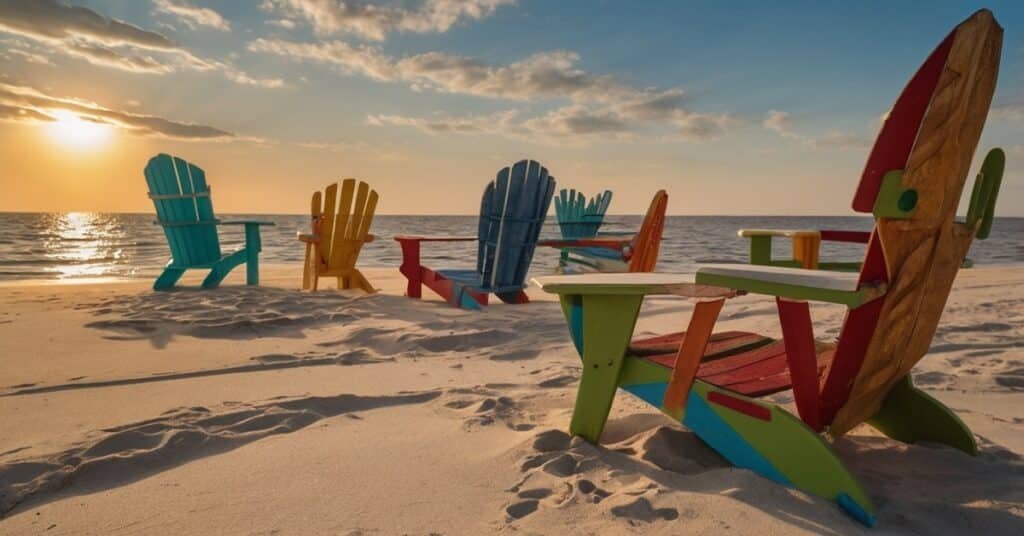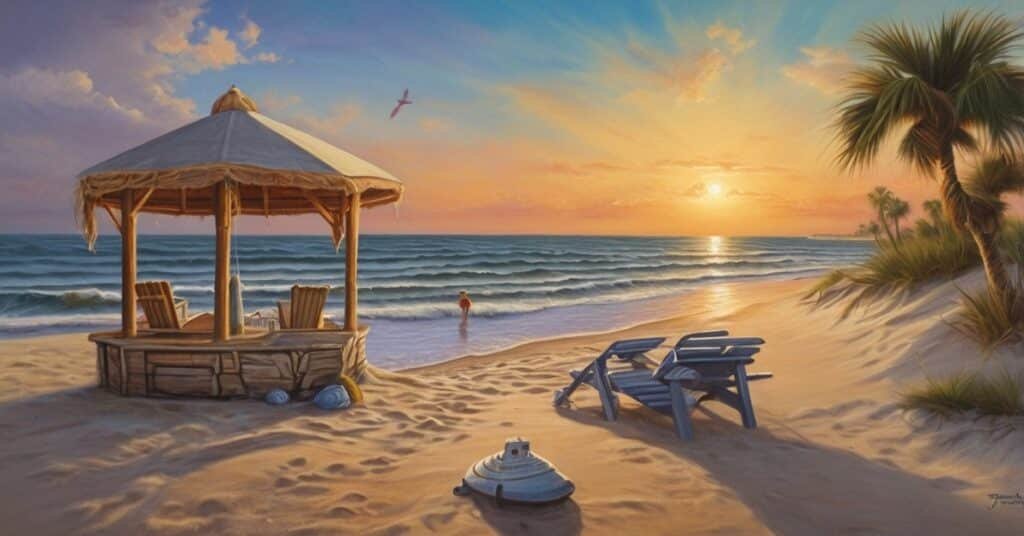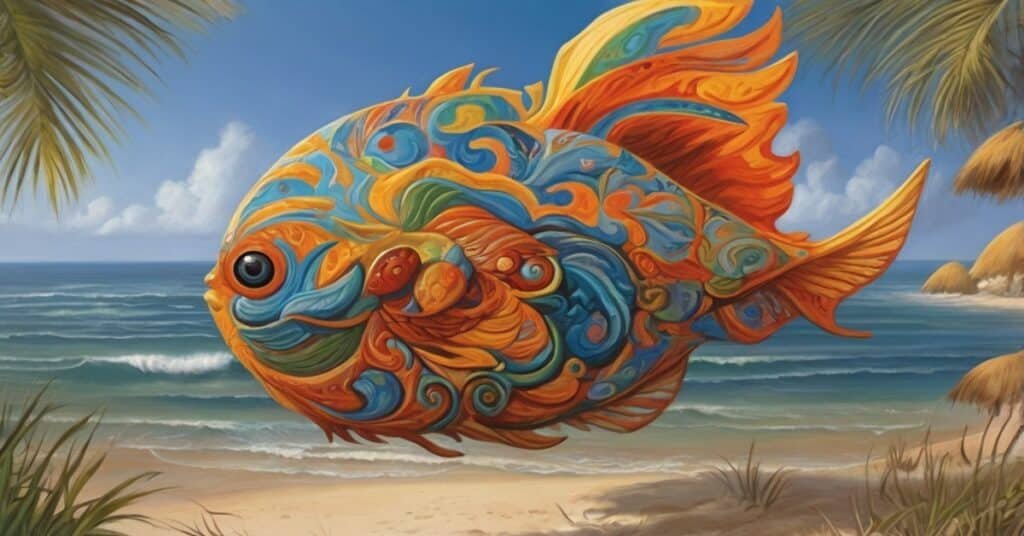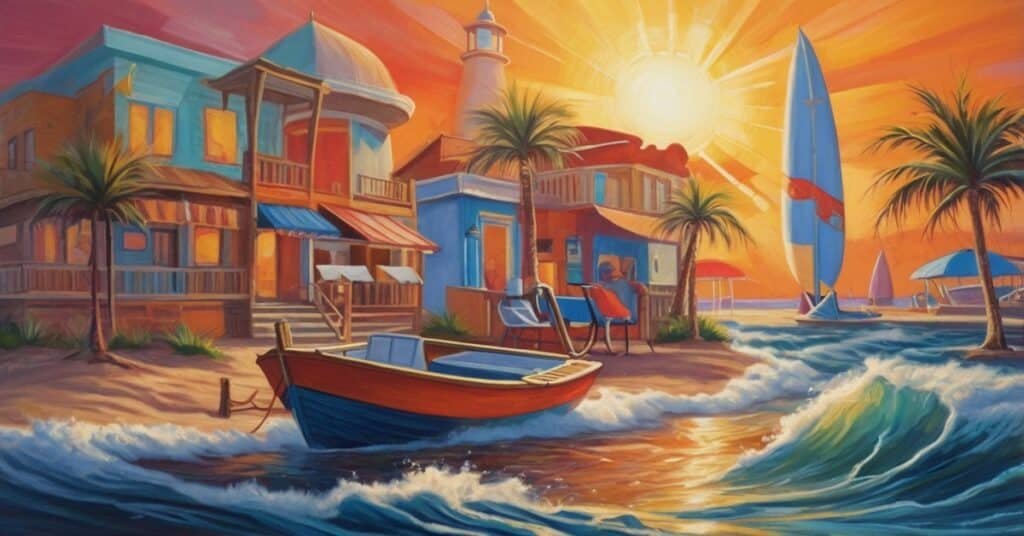The Gulf Coast has always been a place where innovation meets tradition, but nothing quite prepares you for the spectacular fusion of creativity and high-octane excitement that defines Fun Craft Thunderonthegulf. This isn’t your typical weekend craft fair or standard powerboat racing event – it’s a transformative experience that has redefined what a coastal festival can be.
Picture this: master artisans demonstrating centuries-old pottery techniques while the thunderous roar of precision-engineered powerboats cuts through the Gulf waters just yards away. Families work side-by-side creating sustainable jewelry as racing enthusiasts cheer from waterfront viewing decks. This unique combination has attracted over 75,000 visitors annually, making it one of the Southeast’s most distinctive cultural celebrations.
What sets Fun Craft Thunderonthegulf apart from competitors is its deliberate integration of two seemingly different worlds. While most festivals focus on either arts and crafts or motorsports, this event recognizes that creativity takes many forms – from the delicate brush strokes of a watercolor artist to the engineering precision required for competitive boat racing.

The Genesis Story: How Fun Craft Thunderonthegulf Became a Gulf Coast Institution
The story of Fun Craft Thunderonthegulf begins in 2018 when local marina owner Captain Jake Martinez noticed something interesting. His boat slip neighbors included both renowned marine engineers and established regional artists, yet they rarely interacted despite sharing similar creative passions and problem-solving approaches.
Martinez’s vision was simple but revolutionary: create a space where technical precision and artistic expression could coexist and inspire each other. The first event drew 8,500 visitors across a single weekend. By 2024, attendance had grown to over 75,000 people, with participants traveling from 12 states to experience this unique celebration.
The festival’s growth reflects broader trends in experiential tourism. According to the Adventure Travel Trade Association, travelers increasingly seek authentic, hands-on experiences that combine learning with entertainment. Fun Craft Thunderonthegulf delivers exactly this combination, generating an estimated $4.2 million in local economic impact annually.
Local community involvement has been crucial to the festival’s success. Over 200 regional artisans now participate as instructors and demonstrators, while local marine businesses provide technical expertise and equipment for the racing components. This grassroots support has created a self-sustaining ecosystem that benefits the entire Gulf Coast region.
Craft Mastery Unveiled: Beyond Traditional Arts and Crafts
The Five Pillars of Creative Expression
The craft component of Fun Craft Thunderonthegulf goes far beyond basic hobby activities. Professional artisans lead comprehensive workshops designed to teach both fundamental techniques and advanced skills across five core disciplines.
Pottery and Ceramics workshops range from beginner wheel throwing to advanced glazing techniques. Master potter Sarah Chen, who has exhibited in galleries across the Southeast, leads sessions that combine traditional methods with contemporary design principles. Participants learn not just how to shape clay, but understand the chemistry behind different clay bodies and firing temperatures.
Sustainable Jewelry Design represents one of the festival’s most popular categories. Local jeweler Marcus Rodriguez demonstrates techniques using recycled metals and sustainably sourced gemstones. His workshops attract both beginners seeking to create simple wire-wrapped pieces and experienced crafters learning complex metalworking techniques like granulation and repoussé.
Precision Woodworking sessions showcase everything from traditional hand carving to modern CNC machine applications. Master carpenter Elena Vasquez, whose work has been featured in Fine Woodworking magazine, teaches participants how proper tool selection and wood grain understanding can elevate any project from amateur to professional quality.
Mixed Media Painting workshops explore watercolor innovations and acrylic techniques that push traditional boundaries. Participants experiment with texture mediums, metallic leafing, and alcohol ink applications under the guidance of regional artists whose work sells in galleries from New Orleans to Atlanta.
Eco-Craft Revolution activities focus on transforming waste materials into artistic masterpieces. Environmental artist David Kim leads sessions that turn ocean plastic into functional art pieces, demonstrating how creativity can address environmental challenges while producing beautiful, lasting objects.
Interactive Learning Ecosystem
Unlike passive craft demonstrations common at many festivals, Fun Craft Thunderonthegulf employs an active mentorship model. Each workshop maintains a 6:1 participant-to-instructor ratio, ensuring personalized attention and immediate feedback.
The skill progression system allows participants to build capabilities across multiple visits. First-time attendees might complete basic projects in their chosen medium, while returning participants can tackle increasingly complex challenges. Digital portfolios track individual progress, creating a sense of ongoing achievement that encourages return visits.
Technology integration enhances traditional craft instruction without overwhelming it. Tablets loaded with technique videos provide visual references during hands-on work. 3D printers demonstrate how traditional woodworking joints can be prototyped digitally before cutting expensive lumber. These tools supplement rather than replace human instruction, creating a balanced learning environment.
Real-time feedback systems help participants understand their progress immediately. Instructors use simple assessment rubrics that highlight specific improvements and suggest next steps. This approach builds confidence while maintaining realistic expectations about skill development timelines.

Engineering Spectacle: The Science Behind Gulf Coast Powerboat Racing
Technical Innovations on Display
The powerboat racing component of Fun Craft Thunderonthegulf showcases marine engineering at its finest. Unlike casual recreational boating, competitive powerboat racing demands precision engineering that pushes both materials and design to their limits.
Racing boats featured at the festival represent cutting-edge marine technology. Carbon fiber hulls reduce weight while maintaining structural integrity under extreme stress. Advanced fuel injection systems optimize power delivery across varying water conditions. GPS-guided navigation systems ensure precise course following while maintaining safety margins.
Safety technology evolution has transformed competitive racing over the past decade. Modern racing boats feature multi-point harness systems, impact-absorbing seat designs, and emergency beacon systems that automatically activate if a boat becomes disabled. These innovations have reduced serious racing injuries by over 60% compared to earlier generations of racing equipment.
Environmental considerations increasingly influence modern boat design. Several racing teams now use bio-diesel fuel blends that reduce emissions without sacrificing performance. Hull designs incorporate features that minimize wake impact on shoreline ecosystems. These developments demonstrate how competitive motorsports can embrace environmental responsibility.
Performance metrics displayed during races help spectators understand what they’re witnessing. Real-time speed measurements, lap time comparisons, and fuel efficiency calculations are broadcast on large screens throughout the viewing areas. This data transforms casual spectators into informed enthusiasts who appreciate the technical achievements on display.
Racing Categories and Competition Structure
Fun Craft Thunderonthegulf features multiple racing divisions that accommodate different skill levels and boat types. Professional divisions attract teams from across the Southeast, while amateur categories welcome local enthusiasts and first-time racers.
Professional division highlights include the Gulf Coast Speed Challenge, where boats regularly exceed 80 mph on marked courses. Notable participants have included former NASCAR driver Tony Mitchell, who transitioned to powerboat racing after retiring from stock car competition. His team’s innovative use of aerodynamic principles adapted from automotive racing has influenced boat design throughout the sport.
Amateur racing opportunities require only basic boating safety certification and boat inspection. Entry-level categories use standardized engine specifications to ensure fair competition based on driving skill rather than equipment advantages. This approach has encouraged participation from younger racers and families seeking shared adventure activities.
Youth development programs introduce teenagers to marine sports through supervised racing experiences. The Junior Racer Initiative, launched in 2022, has trained over 150 young people in boat handling, safety procedures, and competitive ethics. Several program graduates have advanced to amateur racing divisions, creating a pipeline for future professional competitors.
The economic impact of competitive racing extends beyond the festival itself. Local marine businesses report increased sales of racing equipment, maintenance services, and boat modifications. The presence of professional racing teams has attracted marine industry suppliers to establish regional operations, creating year-round employment opportunities.

Educational Excellence: STEAM Learning Through Creative Adventure
Child Development Through Hands-On Creation
Fun Craft Thunderonthegulf’s educational programming transforms traditional STEAM learning into engaging adventure. Rather than classroom-style instruction, children learn science, technology, engineering, arts, and mathematics concepts through immediate application in craft and racing contexts.
Fine motor skill enhancement occurs naturally through age-appropriate activities. Six-year-olds develop hand-eye coordination while learning basic weaving techniques. Ten-year-olds strengthen finger dexterity through jewelry wire wrapping. Teenagers master precise tool control while creating detailed woodworking projects. These progressions follow established child development principles while maintaining focus on creative achievement.
Problem-solving development happens through creative challenges that require both analytical thinking and artistic vision. Children might need to determine why their pottery piece cracked during firing, leading to discussions about thermal expansion, clay composition, and firing temperatures. These authentic problems engage curiosity more effectively than abstract textbook examples.
Social skills building occurs naturally in collaborative art projects. Mixed-age groups work together on large installations like community murals or group sculptures. Children learn to negotiate creative differences, share materials, and support teammates facing frustration. These interactions develop emotional intelligence alongside artistic skills.
Confidence building through completed projects provides tangible evidence of personal capability. Each child leaves the festival with finished pieces they created independently. Parents consistently report that this concrete accomplishment boosts their children’s willingness to attempt new challenges in other areas of life.
Adult Learning and Skill Acquisition
Adult participants in Fun Craft Thunderonthegulf workshops often discover capabilities they never knew they possessed. Professional development opportunities attract educators seeking new ways to engage their students with hands-on learning approaches.
Art teacher Jennifer Walsh from Mobile County Schools credits her festival experience with transforming her classroom instruction. “Watching master artisans break complex techniques into manageable steps gave me a model for teaching any subject,” she explains. “My students now tackle difficult math concepts using the same progressive skill-building approach I learned in pottery workshops.”
Therapeutic benefits of creative expression attract adults dealing with stress, career transitions, or health challenges. Occupational therapist Dr. Robert Kim has studied festival participants and found measurable improvements in anxiety levels and self-reported well-being among adults who completed multi-day workshop series.
Entrepreneurial skills develop through artisan mentorship programs that connect workshop participants with established craft business owners. Aspiring entrepreneurs learn about pricing strategies, customer development, and production scaling. Several festival participants have launched successful craft businesses based on skills and connections made during the event.
Cultural appreciation and heritage preservation occur through workshops led by traditional craftspeople. Native American pottery techniques, African textile traditions, and European woodworking methods are demonstrated by master practitioners who share both technical knowledge and cultural context. These experiences broaden participants’ understanding of human creativity across cultures and historical periods.
Strategic Event Navigation: Maximizing Your Festival Experience
Pre-Event Planning Excellence
Success at Fun Craft Thunderonthegulf begins with strategic planning that aligns your interests, schedule, and skill level with available opportunities. Workshop selection requires understanding both your current capabilities and desired learning outcomes.
Review the complete workshop schedule at least two weeks before arrival. Popular sessions like “Advanced Jewelry Techniques” and “Powerboat Engine Fundamentals” typically fill within hours of registration opening. Create a prioritized list with backup options to ensure you secure spots in preferred activities.
Skill level matching prevents frustration and maximizes learning. Beginner workshops assume no prior experience and focus on fundamental techniques. Intermediate sessions require basic familiarity with tools and materials. Advanced workshops move quickly through complex procedures and expect participants to work independently with minimal guidance.
Consider family coordination if attending with children or multiple adults with different interests. The festival provides child supervision services for selected workshops, allowing parents to participate in adult-focused activities. Family workshops specifically designed for mixed-age participation offer shared experiences without compromising individual learning.
Budget planning should account for materials, tools, and optional take-home supplies. Most workshops include basic materials in registration fees, but premium options like specialized yarns, exotic woods, or precious metal components require additional investment. Tool rental is available for workshops requiring expensive equipment like pottery wheels or woodworking lathes.
Day-of-Event Optimization
Arrival timing significantly impacts your festival experience. Gates open at 8:30 AM, with first workshops beginning at 9:00 AM. Early arrival ensures parking close to main venues and time to orient yourself before activities begin.
Priority scheduling should balance must-see demonstrations with hands-on participation. Live demonstrations by master craftspeople occur throughout the day but aren’t repeated. Plan your workshop schedule around these unique presentations to maximize exposure to different techniques and approaches.
The festival provides detailed maps showing workshop locations, demonstration areas, racing viewing zones, and amenities. Study this layout before arrival to minimize walking time between activities. Most workshops run for 90 minutes with 30-minute breaks, providing adequate transition time for participants who plan their routes efficiently.
Weather contingency planning is essential for an outdoor Gulf Coast event. Indoor workshops continue regardless of conditions, but racing events and some demonstrations may be postponed or cancelled due to high winds or lightning. Download the festival mobile app for real-time weather updates and schedule changes.
Photography opportunities abound throughout the festival, but timing and location matter for best results. Morning light provides excellent conditions for craft photography, while racing action shots benefit from afternoon sun angles. Designated photography zones near racing courses offer unobstructed views without interfering with participant safety.
Community Impact Analysis: Beyond Entertainment Value
Economic Ripple Effects
Fun Craft Thunderonthegulf generates substantial economic impact that extends far beyond ticket sales and vendor fees. Local artisan income represents one of the most significant benefits, with participating craftspeople reporting average festival weekend earnings of $3,200 per participant.
Tourism revenue statistics demonstrate the festival’s broader economic influence. Hotels within 25 miles report 87% occupancy during festival weekends, compared to 34% during comparable non-festival periods. Restaurants, gas stations, and retail establishments see revenue increases averaging 340% during the three-day event period.
Job creation in creative industries has accelerated partly due to festival exposure. Local craft businesses report hiring increases of 23% since the festival’s inception, with many new positions filled by people who discovered their interests through festival participation. Art supply stores, framing shops, and specialty tool retailers have opened new locations to serve growing demand.
The festival has created a sustainable economic model that benefits the community year-round. Artisan cooperative spaces have developed to house craft businesses launched by festival participants. These shared workshops provide affordable access to expensive equipment while fostering collaboration and skill sharing among entrepreneurs.
Regional tourism promotion extends the festival’s impact throughout the year. Festival marketing attracts visitors who discover other Gulf Coast attractions during their stay. Tourism boards report that 34% of festival attendees return for non-festival visits within 12 months, bringing additional revenue to the region.
Cultural Preservation and Innovation
Traditional craft technique documentation ensures valuable knowledge isn’t lost as older artisans retire. The festival’s partnership with regional universities has created video archives of traditional methods demonstrated by master craftspeople. These resources support academic research while preserving techniques for future generations.
Cross-generational knowledge transfer occurs naturally as experienced artisans work alongside younger participants. Apprenticeship relationships often develop during intensive workshops, creating ongoing mentorship that extends beyond the festival. These connections help traditional crafts evolve while maintaining their essential character.
Cultural diversity celebration through varied art forms exposes participants to creative traditions from around the world. International guest artisans share techniques from their home countries while learning about American Gulf Coast traditions. This cultural exchange enriches the creative community while building international connections.
Innovation in traditional practices emerges when craftspeople from different backgrounds collaborate. Pottery techniques from Japan combined with local clay sources create unique pieces that honor both traditions. These innovations demonstrate how cultural preservation and creative evolution can occur simultaneously.
Success Stories and Transformation Narratives
Festival impact becomes most apparent through individual transformation stories that illustrate the event’s deeper significance beyond entertainment or skill development.
Maria Santos attended her first Fun Craft Thunderonthegulf as a reluctant companion to her art-enthusiast husband. Having never considered herself creative, she reluctantly joined a beginner pottery workshop to pass time while he attended advanced woodworking sessions. Three years later, her pottery pieces sell in galleries across three states, and she credits the festival with revealing capabilities she never imagined she possessed.
Twelve-year-old Jordan Mitchell discovered his passion for marine engineering while attending powerboat demonstrations with his grandfather. The racing teams’ willingness to explain technical details sparked intense curiosity about engine design and hydrodynamics. Jordan now participates in regional robotics competitions and plans to study marine engineering in college.
Retired teacher Patricia Williams found new purpose through festival volunteer opportunities after struggling with post-retirement depression. Her organizational skills proved invaluable for coordinating workshop schedules and participant registration. The social connections and sense of contribution she discovered led to year-round involvement with local arts organizations.
Artisan spotlight stories demonstrate how festival exposure can transform struggling craft businesses into thriving enterprises. Woodworker James Thompson attended the first festival with a card table displaying cutting boards he made in his garage. Six years later, his custom furniture business employs four people and maintains a six-month order backlog, with most new customers discovering his work through festival demonstrations.
Future Vision: Innovation and Expansion Horizons
Fun Craft Thunderonthegulf continues evolving to meet changing participant expectations and incorporate new technologies while maintaining its core mission of combining creativity with adventure.
Technology integration plans include augmented reality applications that overlay technical information onto live demonstrations. Participants could use smartphones or tablets to access detailed explanations of pottery firing chemistry or powerboat engine mechanics while watching real-time processes. These tools would enhance understanding without disrupting the authentic hands-on experience that defines the festival.
Sustainability initiatives reflect growing environmental awareness among participants and the broader community. Solar-powered workshop areas reduce energy consumption while demonstrating renewable technology applications. Waste reduction programs encourage participants to repurpose materials rather than discarding them. Water conservation systems capture and filter runoff from boat washing areas.
Sister event development could extend the festival’s impact to other coastal regions. Discussions with tourism organizations in Florida, Texas, and North Carolina have explored adapting the Fun Craft Thunderonthegulf model to local conditions and cultural traditions. These expansions would create a network of related festivals while maintaining each location’s unique character.
Community feedback integration drives continuous improvement through participant surveys, social media monitoring, and focus groups with regular attendees. Recent feedback led to extended workshop hours, improved accessibility features, and enhanced family coordination services. This responsive approach ensures the festival remains relevant and engaging as participant demographics and interests evolve.
Your Path to Participation
Registration for Fun Craft Thunderonthegulf opens annually on June 1st, with early bird pricing available through July 15th. Online registration at thunderonthegulf.com provides the most convenient option, though on-site registration remains available for spontaneous participants.
Essential preparation includes comfortable walking shoes suitable for outdoor terrain, refillable water bottles to stay hydrated in Gulf Coast heat, and broad-spectrum sunscreen for extended outdoor exposure. Cameras or smartphones will capture memorable moments, while small notebooks help record techniques and inspiration for future reference.
Workshop materials are included in registration fees for most activities, but premium upgrades like exotic woods, precious metals, or specialized tools require additional investment. Tool rental services provide access to expensive equipment like pottery wheels, woodworking lathes, and precision measuring instruments.
Accommodation options range from luxury resort hotels to budget-friendly motels and camping facilities. Booking early ensures availability and better rates, particularly for waterfront properties that offer easy festival access. Several hotels provide special festival packages that include transportation and meal options.
Transportation considerations include parking availability at festival venues and shuttle services from remote parking areas during peak attendance periods. Regional airports in Mobile, Pensacola, and New Orleans provide convenient access for travelers from distant locations.
Fun Craft Thunderonthegulf represents more than a weekend festival – it’s an invitation to discover new aspects of your creativity while connecting with a community that celebrates both artistic expression and technical achievement. Whether you’re drawn by the meditative focus of pottery work, the precision required for jewelry making, or the excitement of competitive powerboat racing, you’ll find experiences that challenge your assumptions about your own capabilities.
The festival’s unique combination of traditional craftsmanship and modern adventure creates opportunities for personal growth that extend far beyond the three-day event. Participants consistently report increased confidence, new friendships, and fresh perspectives on creativity that influence their daily lives long after returning home.
Your creative adventure awaits on the Gulf Coast. Reserve your spot today and prepare to discover what happens when artistry meets adrenaline in one of America’s most innovative cultural celebrations.

Noah James is the author behind PrayersLand, a blog dedicated to inspiring faith, hope, and spiritual growth. With a deep passion for prayer and devotion, he shares heartfelt reflections, powerful prayers, and uplifting insights to strengthen believers on their spiritual journey. His writings aim to bring comfort, wisdom, and divine connection.

